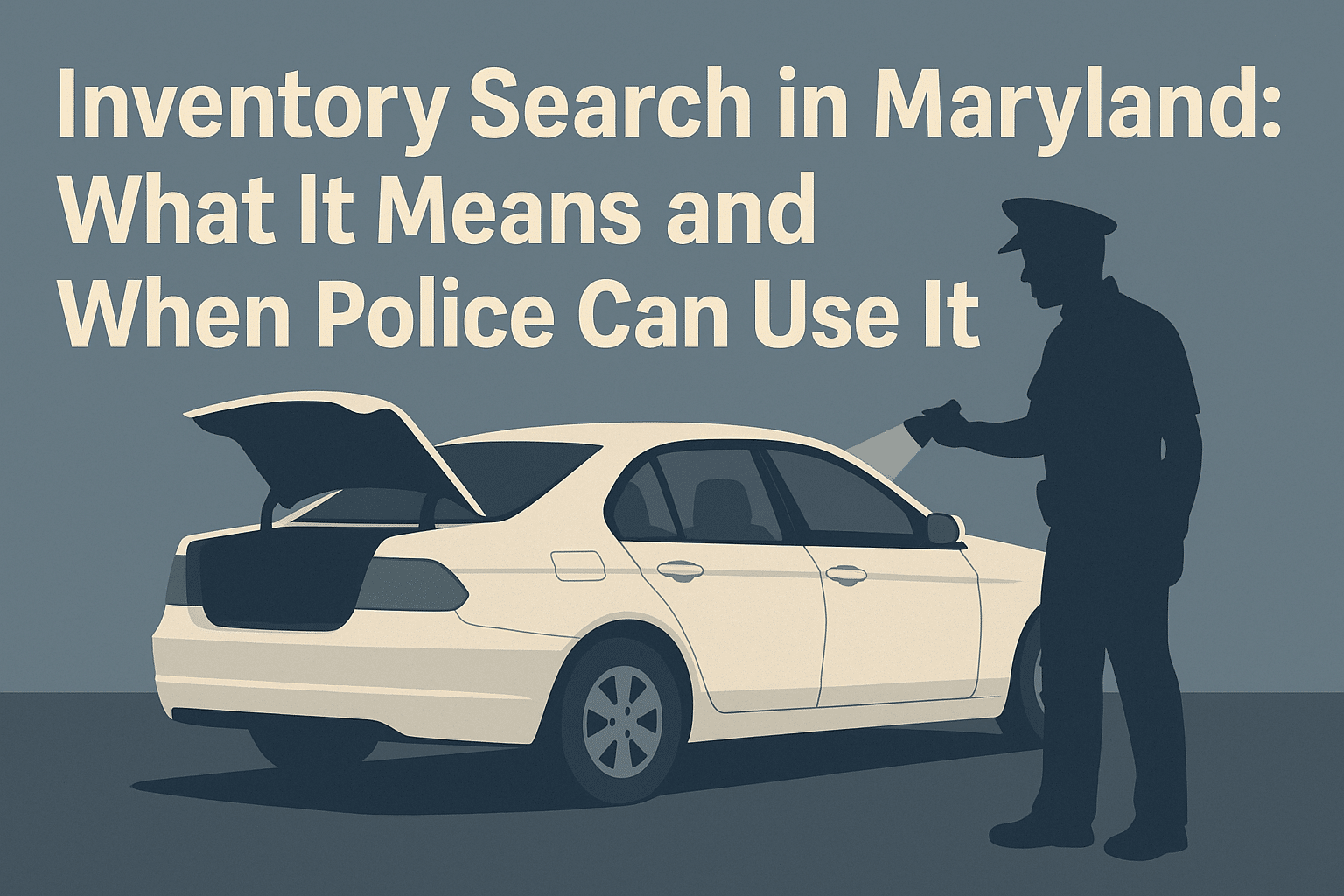
When your vehicle is impounded and a police officer conducts an inventory search, it’s important to understand what that means for your rights—especially if you’re facing criminal charges in Maryland. In this article, we’ll explain what an inventory search is, when it can be lawfully conducted, what the requirements are under Maryland law and federal precedent, and how it differs from other types of vehicle searches.
What is an Inventory Search?
An inventory search is a warrantless examination of a vehicle’s contents carried out after the vehicle has been lawfully impounded or taken into police custody. The purpose is not to discover evidence of crime, but to catalog the contents of the vehicle—protecting the owner’s property, guarding against claims of lost or stolen items, and ensuring officer safety. Because the vehicle is in police control, courts recognize that a reduced expectation of privacy exists and that an inventory may be reasonable under the Fourth Amendment.
When is an Inventory Search Allowed?
An inventory search is permitted when the vehicle is lawfully in police custody (for example, after a traffic stop, arrest, or tow) and the police follow established, standardized procedures for conducting the inventory. The U.S. Supreme Court case South Dakota v. Opperman established that inventories of impounded vehicles are permissible when they are done according to routine police policy or practice—not merely as a pretext for investigation. In Maryland, courts follow similar principles, recognizing that impoundment combined with a consistent departmental policy satisfies the criteria for a valid inventory search. The impoundment must be lawful, not simply a pretext to justify the search, and there must be a policy governing how the contents will be inventoried.
What are the Legal Requirements for a Valid Inventory Search?
Two key conditions must be met:
- Lawful custody or impound: The vehicle must have been legitimately taken into police custody or impounded under relevant laws or policies.
- Standardized procedure: The search must follow a routine, impartial policy adopted by the agency—not an ad hoc or investigatory search disguised as an inventory.
If these requirements are satisfied, courts often find that the inventory search is reasonable under the Fourth Amendment, even without a warrant.
What Happens if Law Enforcement Does Not Follow the Required Procedure?
If either of the key requirements above isn’t met—for example, if the vehicle was impounded solely to permit a search, or if there is no evidence of a standardized procedure—then the inventory search may be deemed unconstitutional. Any evidence found during such a search could be suppressed. Maryland appellate courts have emphasized that the absence of a policy governing how officers open and record closed containers, or failure to show that they followed that policy, undermines the validity of the search. A defendant facing charges should always examine whether the impound was proper and whether officers adhered to a written inventory policy.
How Does an Inventory Search Differ from Other Vehicle Searches?
The main difference lies in purpose and justification.
- A probable cause search requires that law enforcement believe evidence of a crime is present.
- A search incident to arrest allows officers to search a vehicle contemporaneously with an arrest to ensure safety or preserve evidence.
- An inventory search, by contrast, is part of the vehicle impoundment process. It is justified by the community caretaking role of police—to account for and safeguard the vehicle’s contents—rather than by an investigative motive.
Even so, if contraband such as drugs or weapons is discovered during a valid inventory search, it may be used as evidence, provided the search was conducted properly and not used as a ruse for investigation.
Practical Implications for Criminal Defense in Maryland
For residents of Southern Maryland—including Prince George’s, Charles, Calvert, and St. Mary’s Counties—it is crucial to scrutinize any inventory search that leads to evidence or charges. You or your attorney should examine:
- Whether the vehicle was lawfully impounded
- Whether the police followed a written, standardized policy
- Whether the inventory was conducted for caretaking purposes, not investigation
If any of these conditions are lacking, you may have grounds to challenge the admissibility of the evidence in court.
Conclusion
An inventory search sits at the intersection of police caretaking responsibilities and Fourth Amendment protections. When conducted properly—after a lawful impound and under a consistent, non-investigatory policy—an inventory search is generally considered valid. However, if police fail to follow the required procedures or use the process as a pretext for investigation, the search may be unconstitutional and the resulting evidence suppressed.
If you or a loved one has been charged with a crime following an inventory search, contact a qualified Maryland criminal defense attorney to review the facts of your case and protect your rights.
If evidence from an inventory search is being used against you, SoMD Criminal Defense can challenge it. We serve clients in Waldorf, La Plata, Calvert County, St. Mary’s County, and Prince George’s County.
